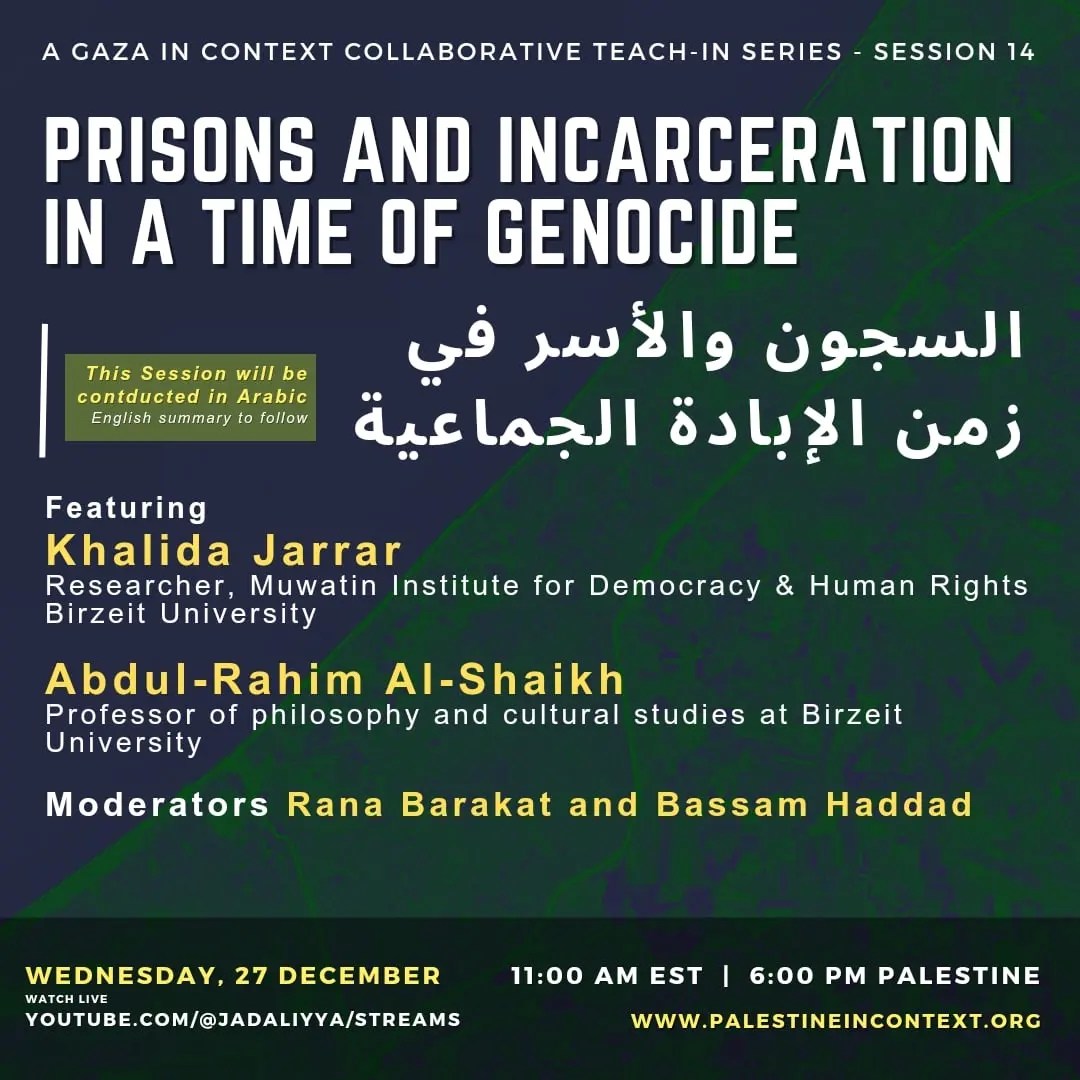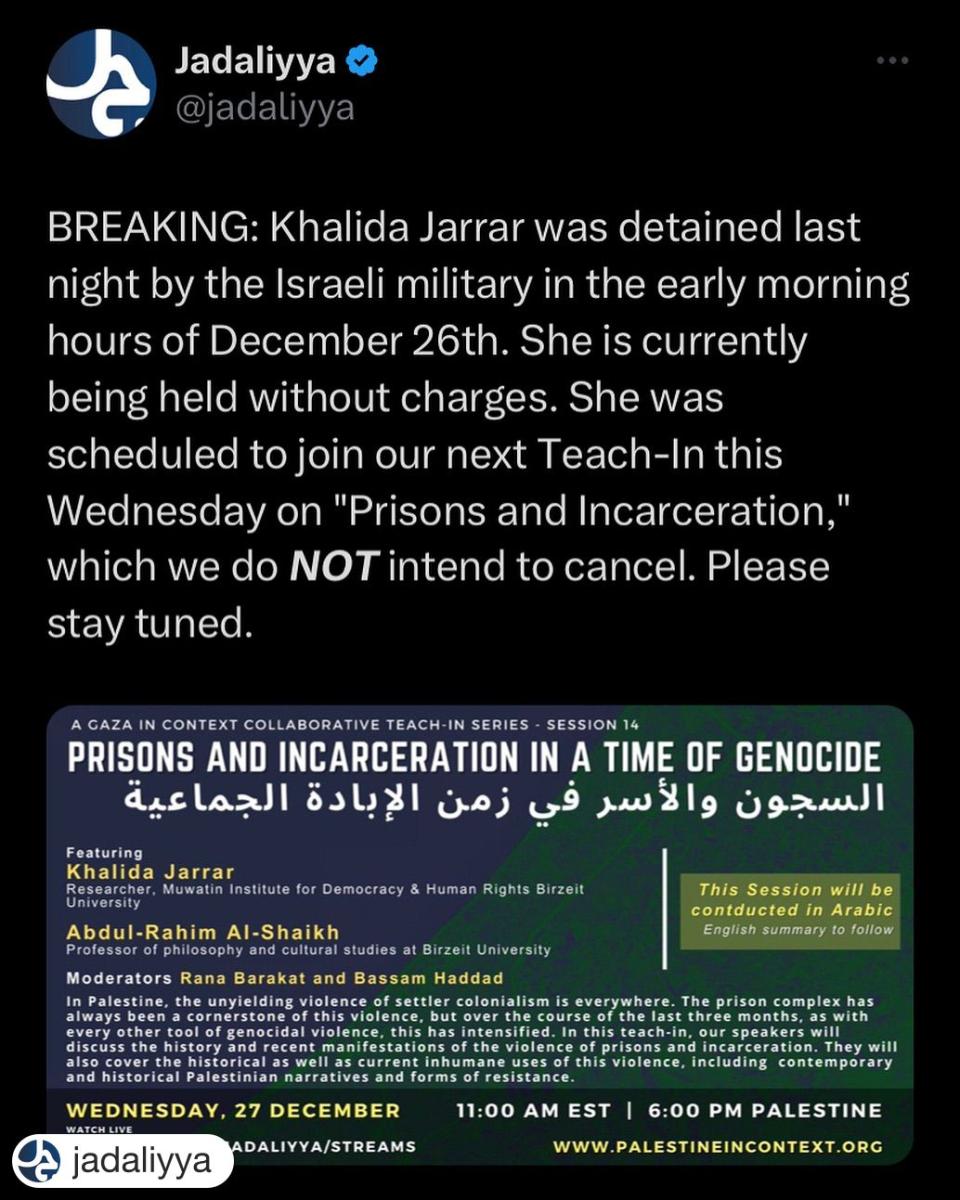
in Palestine, the unyielding violence of settler colonialism is everywhere. The prison complex has always been a cornerstone of this violence, but over the course of the last three months, as with every other tool of genocidal violence, this has intensified. In this teach-in, our speakers will discuss the history and recent manifestations of the violence of prisons and incarceration. They will also cover the historical as well as current inhumane uses of this violence, including contemporary and historical Palestinians narratives and forms of resistance.
Gaza in Context Collaborative Teach-In Series
We are together experiencing a catastrophic unfolding of history as Gaza endures a massive invasion of potentially genocidal proportions. This follows an incessant bombardment of a population increasingly bereft of the necessities of living in response to the Hamas attack in Israel on October 7. The context within which this takes place includes a well-coordinated campaign of misinformation and the unearthing of a multitude of essentialist and reductionist discursive tropes that dehumanize Palestinians as the culprits, despite a context of structural subjugation and Apartheid, now a matter of consensus in the human rights movement.
opes that dehumanize Palestinians as the culprits, despite a context of structural subjugation and Apartheid, now a matter of consensus in the human rights movement.
The co-organizers below are convening weekly teach-ins and conversations on a host of issues that introduce our common university communities, educators, researchers, and students to the history and present of Gaza, in context.
Co-Organizers: Arab Studies Institute, Georgetown University’s Center for Contemporary Arab Studies, George Mason University’s Middle East and Islamic Studies Program, Rutgers Center for Middle Eastern Studies, Birzeit University Museum, Harvard’s Center for Middle Eastern Studies, Brown University’s Center for Middle East Studies, University of Chicago’s Center for Contemporary Theory, Brown University’s New Directions in Palestinian Studies, Georgetown University’s Center for Muslim-Christian Understanding, Simon Fraser University’s Centre for Comparative Muslim Studies, Georgetown University-Qatar, American University of Cairo’s Alternative Policy Studies, Middle East Studies Association’s Global Academy, University of Chicago’s Center for Middle Eastern Studies, CUNY’s Middle East and Middle Eastern American Center, University of Illinois Chicago’s Arab american cultural Center, George Mason University’s AbuSulayman’s Center for Global Islamic Studies, University of Illinois Chicago’s Critical Middle East Studies Working Group, George Washington University’s Institute for Middle East Studies, Columbia University’s Center for Palestine Studies, New York University’s Hagop Kevorkian Center for Near Eastern Studies
Featuring
Khalida Jarrar is an ex-prisoner and researcher at the Muwatin Institute for Democracy and Human Rights at Birzeit University. She has a Bachelor’s degree in business administration and a Master’s degree in Democracy and Humans Rights, both from Birzeit University. She is a Palestinian feminist human rights activist and advocate, and a former member of the Palestinian Legislative Council (PLC).
Abdul-Rahim Al-Shaikh is a poet, professor of philosophy and cultural studies at Birzeit University, and senior fellow at the Institute for Palestine Studies. His work is focused on poetics, theory, and translation, with a special emphasis on representations of Palestinian identity in prison, camp, and cemetery. His latest publications include: The Drawer of the Circle (2023), Conceptualizing Modern Palestine II (2024), and The Other Voice: An Introduction to the Phenomenology of Metamorphosis (2021), all in Arabic. Currently, he is working on two ongoing projects: “The Palestinian Living Cemetery” and “Parallel Consciousness: Walid Daqqah's Prison.”
Rana Barakat (Moderator) is an assistant professor of history at Birzeit University in Palestine. Her research interests include the history and historiography of colonialism, nationalism, and cultures of resistance. She is currently working on a book monograph titled "Lifta and Resisting the Museumification of Palestine: Indigenous History of the Nakba," which advances an indigenous understanding of time, space, and memory in Palestine by focusing on the details of the people and place of Lifta village over time.
Bassam Haddad (Moderator) is Founding Director of the Middle East and Islamic Studies Program and Associate Professor at the Schar School of Policy and Government at George Mason University. He is the author of Business Networks in Syria: The Political Economy of Authoritarian Resilience (Stanford University Press, 2011) and co-editor of A Critical Political Economy of the Middle East (Stanford University Press, 2021). Bassam is Co-Founder/Editor of Jadaliyya Ezine and Executive Director of the Arab Studies Institute. He serves as Founding Editor of the Arab Studies Journal and the Knowledge Production Project. He is co-producer/director of the award-winning documentary film, About Baghdad, and director of the acclaimed series Arabs and Terrorism. Bassam serves on the Board of the Arab Council for the Social Sciences and is Executive Producer of Status Audio Magazine and Director of the Middle East Studies Pedagogy Initiative (MESPI). He received MESA's Jere L. Bacharach Service Award in 2017 for his service to the profession. Currently, Bassam is working on his second Syria book titled Understanding the Syrian Calamity: Regime, Opposition, Outsiders (forthcoming, Stanford University Press).
Click here to watch this Teach-In Session 14 Gaza in context

